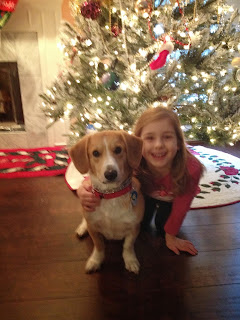Confession time...I’m a multi-tasker and have trouble focusing on
one thing at a time. In fact, I was one of those kids who received the checked
box next to the comment, “Does not concentrate on task at hand,” on almost
every report card throughout grade school.
To this day, I justify my struggle with focus by saying I am a
very creative person and I need to live experientially and savor the richness
of the world around me in order to be a better writer. However, I understood
very early in life that if I did not learn to focus I would be in trouble. The
only nun who was impressed with my creativity was my English composition
teacher.
The others—not so much. So I became very intentional about focus and
it has paid off.
Which brings us to Louie, who shares my struggle with focus. I
recently shared with our trainer that he seems a bit skittish when I walk him
in the dark and he has a hard time focusing on what he needs to do while we’re
outside. The trainer reminded me that I am alpha, which means confidently
leading Louie in a way that is fun and gives him safe freedom to do his thing,
despite the darkness.
One beautiful morning, right before dawn, we walked a little
further than normal and were moving at a pretty good clip. Since there was no
one else around to whom Louie could react, I decided to check emails on my
phone. In a flash, Louie jerked to the left, my phone went flying and three
large creatures ran in front of us. They were harmless deer but they
definitively startled Louie—and me. The deer moved on but it was a few minutes
before my heart stopped racing and Louie settled down. As I picked up my phone,
I had to shake my head...I know better than to check email, walk the dog, and
pay attention to my surroundings simultaneously. Walking Louie only takes a
small chunk of time each day, and he deserves my undivided attention—especially
when we’re walking in the dark.
And so it is with our teams, loved ones, friends, and people in
general. Yet, we pay so little attention to others and rarely give them our
focus and undivided attention. We sit in restaurants on our phones, checking
Facebook or seeing if we received that “important” text or email. If we are
attentive, it is usually because we want to get our point across as soon as
that person stops talking. Let’s face it, sometimes it’s easier to carry on
“virtual” conversations than it is to fully engage in real ones.
There is no greater gift we can give someone than to be fully present.
People long to be known and understood. And the best way to know someone is to
intentionally focus on what they are saying by not only hearing their words but
also hearing their heart. It takes time and effort to truly “hear” people, yet
it is the best way to demonstrate that you value and honor them.
As we celebrate the Christmas season, practice being fully
present with whomever you’re with. Take some time to truly focus on those
around you and whom you spend time with. Be intentional, put down your phone,
step away from the technological noise and listen to their words and pay
attention to what their hearts might be saying. We’ve been given the best gift
humanly possible through the birth of Christ. He modeled how to connect deeply
with others. I once heard Willow Creek Community Church Founder Bill Hybels said.
“You will never lock eyes with someone who does not matter to God.” I often remind
myself of that as I sit across the table from someone, walk through Findlay
Market, or take Louie on a walk and say hello to neighbors I only see
occasionally throughout the winter months. I am intentional about locking eyes
with others not because I learned this in a business course or from the latest
new leadership guru, but because people matter to God and therefore matter to
me!
The best present you can give to others is to be present with them.
Have a blessed Christmas!
Louie and Evi!
DiStasi Advisors will be closed from December 23 through January 6th. We hope you and your loved ones enjoy this blessed time of celebration.





